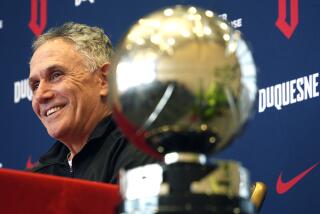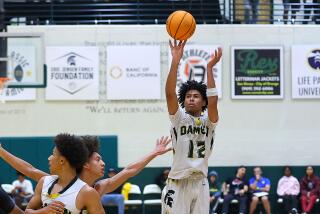Ray Meyer, 92; Was Basketball Coach at DePaul for 42 Years
- Share via
Ray Meyer, who molded an inexperienced big man named George Mikan into a great basketball player in the early 1940s and tamed the exuberant showiness of Mark Aguirre long enough to lead the DePaul Blue Demons to the Final Four in 1979, died Friday in Chicago. He was 92.
Meyer, who compiled a record of 724-354 over 42 years of coaching at DePaul, a small Catholic university on the north side of Chicago, had often used a wheelchair in the last few years as his hip bone deteriorated.
When Mikan died in June 2005, Meyer was still giving lively interviews about his memories of his first meeting with Mikan, an ungainly 6-foot, 10-inch freshman with thick eyeglasses who hadn’t played basketball in high school.
“I saw George Mikan,” Meyer said last year, “and I saw my future.”
Mikan would go on to become a two-time college player of the year and the first true big man with skills that would have served a guard well.
Meyer died at an assisted-living facility surrounded by family, said DePaul Athletic Director Jean Lenti Ponsetto. Though no official cause of death has been released, the Chicago Tribune reported that Meyer died of congestive heart failure.
Meyer was born Dec. 18, 1913, into a Chicago family of nine children. He spent two years in a seminary studying to become a priest, but the pull of basketball was too great and he accepted a scholarship to play at Notre Dame.
He began his coaching career as an assistant there in 1940. Two years later he was named head coach at DePaul, a position he held until his retirement in 1984.
In Meyer’s last game as head coach, his Blue Demons were upset in overtime by Wake Forest in the regional semifinals of the NCAA tournament.
His son Joey, a key assistant, took over as head coach but struggled to escape the shadow of his father, who had an office in the athletic department as an ambassador for DePaul.
A year after Ray Meyer retired, his wife, Marge, died of a heart attack. “We had been given all sorts of trips as retirement gifts,” he said. “We took one. I didn’t have the heart to take any others without Marge.”
But Meyer was ubiquitous in Chicago. He was a radio broadcaster for DePaul games and loved to dine out and be seen around town. But he also worried about the toll coaching was taking on his son.
“Joey doesn’t eat; he stays up all night watching tape. I worry,” Meyer told a Chicago newspaper. “He places too much importance on the game. Sometimes I think he should walk away.”
Joey Meyer was forced to resign in 1997 after the Blue Demons finished 3-23, the worst season in school history.
Ray Meyer felt betrayed, and cut his ties with the place where he had spent 55 years.
When DePaul honored Meyer’s 1979 NCAA Final Four team 20 years later, the coach -- who was as popular around Chicago as Mike Ditka or Michael Jordan would become -- refused to attend the 1999 ceremony.
But later that year, when the school dedicated the $13-million Ray Meyer Fitness and Recreation Center, the old coach returned to the school, the grudge buried.
Possibly Meyer’s greatest coaching victory came at Pauley Pavilion in 1979, when his Blue Demons beat UCLA, 77-71, to earn a trip to the Final Four. DePaul wound up losing to Larry Bird’s Indiana State team, 76-74, and Meyer’s moment of triumph was pushed aside in the hoopla surrounding the NCAA final pitting Bird against Magic Johnson and Michigan State.
Aguirre, Meyer’s biggest recruit in three decades, was a freshman on that Final Four team, and in 1981 Aguirre brought a top-ranked DePaul team with a 27-2 record into the NCAA tournament. In a major first-round upset, though, St. Joseph’s beat DePaul, 48-47. When the buzzer went off, Aguirre ran out of the arena and walked back to the team hotel. Meyer shed a tear for Aguirre, he said, not for himself.
By this time Meyer had brought DePaul basketball to national prominence -- something that had seemed unlikely in the 1950s and 1960s, when other programs began building bigger arenas and using newfound television money to recruit nationally.
“We were like a family-run operation,” Meyer said, “and we had to decide to move it up or give it up.”
Duke Coach Mike Krzyzewski, a Chicago native, spoke of Meyer on Friday at the NCAA Atlanta Regional in Greensboro, N.C. “He was the face of college basketball in Chicago,” Krzyzewski said. “When you think of basketball in that city, you think of Ray Meyer.”
In addition to Joey, who is coaching in the NBA developmental league, Meyer is survived by two other sons and two daughters.
More to Read
Go beyond the scoreboard
Get the latest on L.A.'s teams in the daily Sports Report newsletter.
You may occasionally receive promotional content from the Los Angeles Times.










